
Books, etc.

Summary: As the title suggests, this work is a presentation of the lives of three women of Appalachia, two White women, one Black. They are interesting, engaging, complex human beings whose lives have been lived off the beaten path, lives struggling with amazing endurance against tremendous odds. One important feature of the book is that their lives are told by the women themselves in their own voices from multiple interviews personally recorded which are blended and crafted to form unified, progressive, deeply personal monologues. These women are not unique; rather they are in part representative of a whole category of women across Appalachia, as well as across America—representative, but certainly not simply stereotypical of Appalachians. They are part of the diversity of Appalachia. And to understand these women individually, as well as Appalachia of which they are a part, one needs to listen to them, and (appropriating Hamlet’s words) “what unworthy a thing” we make of them if we do not perceive that there is “much music, excellent voice” in what they have to say.
Review: “Burton offers . . . a gift both to his readers and to the women whose lives he chronicles in their own words. They are women who, one feels, might be seen any day of the week at the grocery or bus stop or in the halls of one’s place of work. But . . . their response to repeated betrayals, lengthy confusions, brief triumphs, and failed or unsuccessful strategies of endurance, all finally appear moving, monumental and memorable.”—Professor Erika Brady, Western Kentucky University
Review: “Presenting the women’s lives in their own words, Burton invites readers to consider their mystery by following ‘each of the women as though you were having the opportunity and the privilege . . . to watch a player present her own private role “as ’twere the mirror up to nature.” ’ . . . maybe that’s the point—to listen without judging or categorizing: Taken as such, these stories allow readers to hear voices of women often silenced, providing a window into human experience that might otherwise pass into history unrecorded.”—Jane Marcellus, Chapter 16
Book may be purchased at Amazon and The University of Tennessee Press
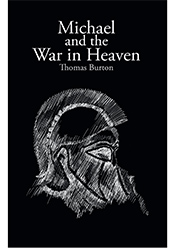
Summary: "Michael and the War in Heaven is a highly allusive narrative revolving around Michael in the victory over his recreant friend and rival, Lucifer. Physically, mentally, ethically, Michael exemplifies the traditional qualities of the hero and the values of Western culture. Figuratively, he represents good in the universal struggle with evil. Allegorically, through the Creative Spirit (epitomized by Gabrielle), he focuses on reality in opposition to appearances, prevails over despair, and attains spiritual realization. Allusive classical, Miltonic, Shakespearean, and other literary figures complement the three main characters in this essentially human, spiritual, nonreligious gest. Besides all that, Michael’s story is a good one in the telling.
A literary guide is included as a complement to the text for individuals, classes, and other groups who wish to pursue the analytical items provided.”—Book Cover
The accompanying analytical apparatus includes for each section readings which are directed toward specific allusions, text-related items to google, lists of themes and reiterated imagery, reflective statements/questions relative to characterization, and topics for discussion, writing, or reflection.
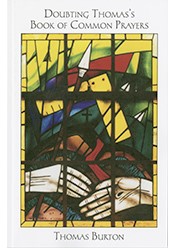
Summary: Doubting Thomas's Book of Common Prayers is a chapbook of highly allusive, reflective poems set forth in an elegiac structure. As the author suggests in the "Preface": "Frustrations with self, with personal beliefs, with relationships human and spiritual, with the nature of things—all seem like Samuel Johnson's apprehensions, beasts we never slay, only continually beat back to their dens. Even poets seem to have no adequate response. Their bootless cries, as well as ours, often 'trouble deaf heaven' with 'no language but a cry,' even though they—as we must—challenge monsters of the dark and deep with heroic fortitude in overcoming doubt and despair. Some of these common frustrations without the security of a net or golden chain from heaven are the inspiration of these spiritual, non-religious prayers."
Back Cover Blurb: “The operative word in Tom Burton’s title is clearly 'doubting,' not fashionable skepticism, but a questioning informed by experience and a broad range of literary study. Burton undergirds his thoughts on everyday life with allusions to Chaucer, Shakespeare, and his cherished Victorian mentors, Browning and Tennyson. His wisdom is revealed, as Eliot says of the latter's, not by the strength of his convictions, but by the 'quality of his doubt.'" —Don Johnson, Professor Emeritus and Poet in Residence, East Tennessee State University
Book may be purchased at Amazon and also at Finishing Line Press
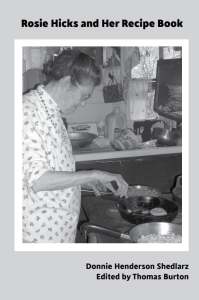
Summary: Rosie Hicks is the deceased widow of Ray Hicks, the internationally known traditional storyteller from North Carolina. She lived in the shadows of all the publications and publicity of Ray; nevertheless, she is an interesting person in her own right. Her life is an engaging story, both as an individual and as a representative of a culture that has for the most part passed away. And that story is told in this little book directly from a series of recorded interviews by Donnie Shedlarz. The book focuses on Rosie’s wonderful anecdotes of growing up in Beech Mountain, North Carolina, including her marriage to Ray; but it also includes the recipes that she kept in an old recipe book, as well as a number of family photographs.
Currently out of print.
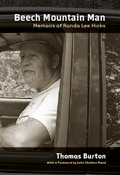
Summary: "Ronda Lee Hicks . . . is a gifted storyteller. Ronda’s stories are about himself, his family, friends, and acquaintances, . . . events, ranging from drunken debauchery to brutality. . . . Embedded in all of Ronda’s stories are numerous details of mountain life, work, entertainment, behavior, beliefs, values, and codes. Thus . . . readers will not only meet a truly singular individual but will also learn of many obscure features of southern Appalachian mountain culture, including its darker aspects." — Jacket.
Review: "Thomas Burton is . . . a pioneer in the sensitive portrayal of mountain folk culture. This book captures the life story of a man who exemplifies the sometimes violent under class of mountain culture." —Appalachian Heritage
Review: "Hicks’ story is not easy to read because of the circumstances of his life and actions. Hicks lives by a code of ethics and values that may appear quite alien . . . a snapshot of a culture that seems frozen in time, where people take care of themselves and address actual and perceived wrongs to themselves, family and friends. . . . recommended for college and university libraries, and for public libraries with an interest in Appalachian life and culture."—Virginia Salmon, Tennessee Libraries
Review: "Thomas Burton’s edition of what amounts to an autobiography of Ronda Lee Hicks—fighter, drinker, womanizer, and storyteller—represents a whiff of late-night honky-tonk whiskey and tobacco in its realism. . . . Hicks is a talented raconteur, whose gifts are well displayed in Burton’s careful editing."—Erika Brady, Western Kentucky University
Book may be purchased at Amazon and The University of Tennessee Press
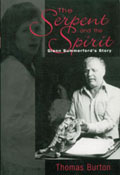
Summary: "In this comprehensive, multilayered set of narratives, the story of Glenn Summerford’s fall from grace [his conviction of attempting to murder his wife with serpents they used in church services] is told by its participants, through interviews, court documents, and other primary sources. . . . this book presents an absorbing story of a fascinating group of people, while allowing the reader to draw his or her own conclusions about Summerford’s guilt or innocence. The Serpent and the Spirit is a startling commentary on truth and its representation, religion and its expression, humanity and its flaws."—Publisher’s catalogue
Review: "Burton, whose Serpent-Handling Believers is essential to any investigation into this practice, has chosen to allow the involved parties—accuser and accused, family members, church brethren, lawyers and doctors—to present their stories in their own words, and the result is a riveting Rashomon of he-saids and she-saids. Though Summerford was convicted, the many-faceted testimony leaves much to the reader’s powers of assembly and winnowing and also offers valuable insight into those very ordinary, though often jeopardized, church-goers who take literally the passage in the Gospel of Mark which may invite true believers to handle poisonous reptiles."—R.T. Smith, Shenandoah
Review: "This is more than a story about the headline ‘Preacher tries to murder wife—with rattlesnakes!’ It is a story of individuals struggling with their faith and their fate under the steady gaze of their God."—Ralph W. Hood Jr., winner of the American Psychologogical Association’s William James Award
Review: "Each version of the story is told in a unique voice and, as Burton reminds the reader, each of these voices ‘has a beauty of its own’ (p.4). We are fortunate to have a work such as The Serpent and the Spirit and an able craftsman like Thomas Burton, committed as he is to the beauty and intricacy of a story and not blinded by the quest for a single, simple truth."—Jaman Matthews, Journal of American Folklore
Comment: A summary of the book is "not an elevator pitch for a new horror series. It's true crime spun out in Alabama Snake, a recent HBO documentary based on a book [The Serpent and the Spirit] by Vanderbilt alumnus Thomas G. Burton [who] is to Appalachia what Shelby Foote is to the Civil War . . . as he recounts the macabre tale of Glenn Summerford." —Jan Read, Vanderbilt Magazine
Book may be purchased at Amazon and The University of Tennessee Press
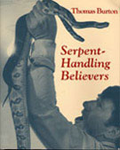
Summary: "Using both oral history and scholarly research, Burton traces the evolution of Christian serpent handling from its beginning and explores legal and ethical issues associated with this and other unorthodox practices, allowing participants to speak for themselves through personal interviews. The result is both a dramatic presentation, through vivid photography, and a thorough analytical insight into the serpent handlers’ culture."—Publisher’s note
Review: "Burton’s lucid and learned account of the phenomenon shows how serpent-handling began over ninety years ago in the American South. . . .He begins . . . by showing sympathetic respect for the people concerned, describing them as good people intent on holiness, . . . and in no way crazed." --David Martin, Times Literary Supplement
Review: "Burton’s book is the most authoritative study yet of the serpent-handling Pentecostals in the eastern United States."—Peter Hocken, Society for Pentecostal Studies
Review: "Burton’s special respect for people and their beliefs, honest and wide-ranging intellectual perspectives, and clear writing make this pioneering book highly recommend[ed]."—Newsletter of the North Carolina Folklore Society
Book may be purchased at Amazon and The University of Tennessee Press
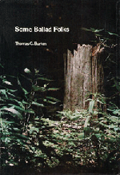
Summary: "Some Ballad Folks provides perspectives of five mountain women and their traditional ballads of British origin. Texts, tunes, photographs, and analysis are given, but the focus is upon the singers’ own life histories and discussions of these old songs."—Book cover
Review: "There are tales, anecdotes, superstitions, beliefs and folk wisdom which the singers choose to share. . . . Dr. Burton’s modest study is a model for linking song texts with biographical information to construct a ‘total folk culture’ and experience, and first-class scholarship in an appealing format."—Come-All-Ye
Book may be purchased at Amazon and The Center for Appalachian Studies and Services

Summary: "Each piece delineates the influences of the musical careers of Tom Ashley, Sam McGee, and Bukka White, representing east Tennessee’s Anglo-American tradition, middle Tennessee’s country music tradition, and west Tennessee’s African American tradition respectively."—Publisher’s note
Review: "This book is strongly recommended for those who are interested in southern folk music and its commercial extensions."—Bill C. Malone, American Music
"The editor’s style transcends the expected ordinary exposition . . . [and] discographies, an index of song titles, and a general index all contribute to the usefulness of this study to students and scholars."—Michael Davenport, Bulletin of the Society for American Music
Book may be purchased at Amazon and The University of Tennessee Press

Summary: This Festschrift honors a distinguished faculty member of East Tennessee State University, Professor Christine Burleson, with scholarly articles on Hawthorne, Tennyson, Dante, Shakespeare, Eliot, Milton, Faulkner, Kierkegaard, Dickinson, and the English language. The authors of the articles include scholars, former students, and friends from Vanderbilt, Tennessee (Knoxville), Belmont, Maryland, Wisconsin State, and East Tennessee State universities.
Currently out of print.

Summary: Folksongs and Folksongs II are a part of the attempt of the editors to preserve some of the traditional lore of East Tennessee and surrounding area and to make it accessible to both the general public and the research scholar. When possible, this material is audio recorded and housed in the Thomas G. Burton and Ambrose N. Manning Collection of the East Tennessee State University Archives of Appalachia. The songs included in Folksongs are from the first five reels of magnetic tape recordings in this collection. Folksongs II includes the songs of Tab Ward, Buna Hicks, Hattie Presnell, and Ora Payne—all members of a vitally important traditional music family and heritage of Beech Mountain, North Carolina. Musical notation is given of the first verse and burden of each song, including a diagram of the notes used, the tonal center, the specific mode, and the range.
Currently out of print.

Currently out of print.

Summary: This collection of research is a selection of papers presented over a four-year period (1962-66) by students in the folklore classes of Professor Ambrose Manning. The topics run from general lore to folktales, legends, riddles, superstitions, and ghosts.
Currently out of print.



